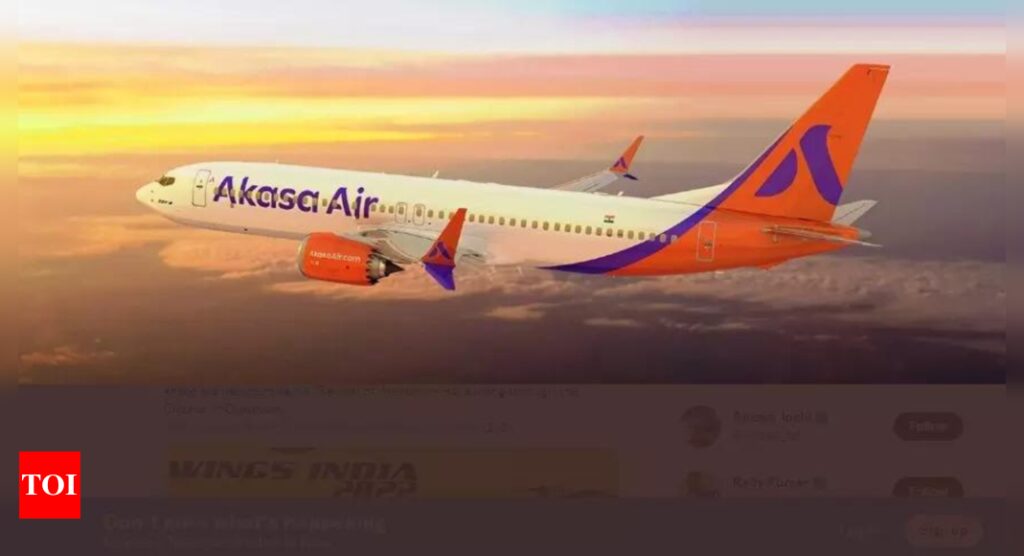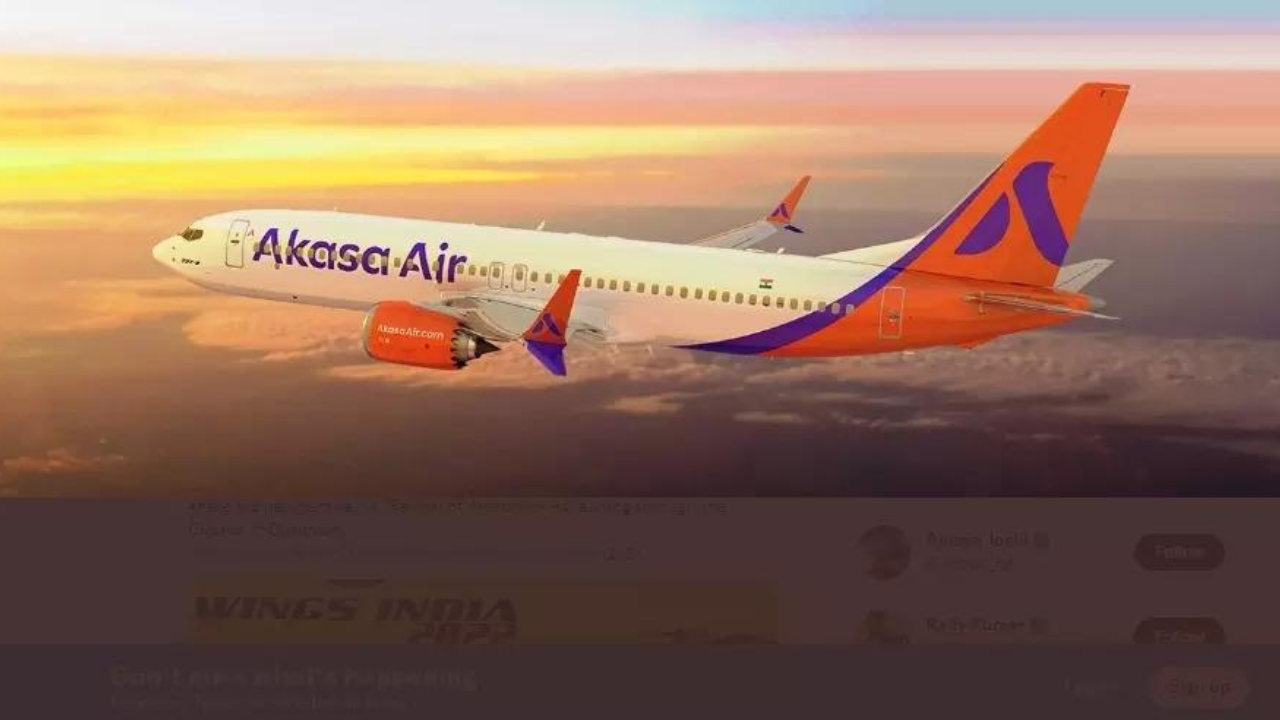[ad_1]
NEW DELHI: Thirteen-month-old Akasa has sued over 40 pilots who resigned from it to join other airline/s in the past couple of months. The virtual exodus has forced the airline, which started flying last August, to cancel several flights since last month. As a result, its August 2023 domestic market share had slipped behind that of cash-strapped SpiceJet which it had overtaken in June. Akasa is learnt to have sought about Rs 22 crore as compensation towards loss of revenue and reputation from the 43 pilots who it claims left without serving the mandatory notice period.
Citing breach of training agreement, the “particulars of claim” in a notice served to one of the pilots reads: “Loss of operational profits on account of business disruption caused… (by) cancellation, rescheduling and grounding of flights… loss of reputation…” Apart from moving court, the airline has also written to aviation authorities on the issue. Akasa has reached a fleet size of 20 aircraft within a year of starting operations.
While senior pilots across airlines favoured “ethical hiring” where “poaching” does not happen in a way that disrupts operations of some other carrier which has been meeting its side of contractual obligation like paying on time, they unanimously said the same should not be attempted to be enforced through the legal requirement of a six-month notice period. “When an airline adds capacity or starts operations, it also ‘poaches’ from some other carrier affecting the latter’s operations. So let he who has not sinned cast the first stone it terms of taking legal action against pilots who have quit without serving notice period,” they said.
Secondly, pilots point out cases of some airlines — this does not include Akasa so far — that have been defaulting on their side of contractual obligation of paying employees salaries on time for month using the six-month notice period to stop their pilots from leaving. One such airline even approached the DGCA on the issue and fortunately, the regulator did not intervene.
“These are HR issues best sorted out between airlines. In an ideal world, the regulator should not intervene in such issues. The six-month notice period was brought in to protect consumer rights by avoiding schedule disruptions and people suddenly finding (a) the flight they had booked has been cancelled and (b) they now need to buy sky-high spot fare tickets on other airlines. While that was the idea, the provision has also been misused by financially weak airlines to hold on to their staff without being able to pay them in time for months on end. Ideally this clause should not be there but there has to be some discipline in the industry before its removal can be considered,” said a retired senior DGCA official.
So what is the way forward? “This is a cyclical issue. Unfortunately every few years big airline/s collapse globally and in India too, leaving scores of employees desperately looking for jobs. Most recently we saw that with GoAir. There is immense suffering then. Then are times when airlines are chasing employees and poaching happens. This cycle is unlikely to end. Now that India is moving to a more structured airline industry with two mega players — Tata airlines and IndiGo — and a smaller emerging player (not taking into account regional carriers) there will hopefully be sone hiring discipline in coming years just like we have been seeing pricing discipline with hardly any below cost fares being offered by airlines in recent months,” said officials across airlines.
Citing breach of training agreement, the “particulars of claim” in a notice served to one of the pilots reads: “Loss of operational profits on account of business disruption caused… (by) cancellation, rescheduling and grounding of flights… loss of reputation…” Apart from moving court, the airline has also written to aviation authorities on the issue. Akasa has reached a fleet size of 20 aircraft within a year of starting operations.
While senior pilots across airlines favoured “ethical hiring” where “poaching” does not happen in a way that disrupts operations of some other carrier which has been meeting its side of contractual obligation like paying on time, they unanimously said the same should not be attempted to be enforced through the legal requirement of a six-month notice period. “When an airline adds capacity or starts operations, it also ‘poaches’ from some other carrier affecting the latter’s operations. So let he who has not sinned cast the first stone it terms of taking legal action against pilots who have quit without serving notice period,” they said.
Secondly, pilots point out cases of some airlines — this does not include Akasa so far — that have been defaulting on their side of contractual obligation of paying employees salaries on time for month using the six-month notice period to stop their pilots from leaving. One such airline even approached the DGCA on the issue and fortunately, the regulator did not intervene.
“These are HR issues best sorted out between airlines. In an ideal world, the regulator should not intervene in such issues. The six-month notice period was brought in to protect consumer rights by avoiding schedule disruptions and people suddenly finding (a) the flight they had booked has been cancelled and (b) they now need to buy sky-high spot fare tickets on other airlines. While that was the idea, the provision has also been misused by financially weak airlines to hold on to their staff without being able to pay them in time for months on end. Ideally this clause should not be there but there has to be some discipline in the industry before its removal can be considered,” said a retired senior DGCA official.
So what is the way forward? “This is a cyclical issue. Unfortunately every few years big airline/s collapse globally and in India too, leaving scores of employees desperately looking for jobs. Most recently we saw that with GoAir. There is immense suffering then. Then are times when airlines are chasing employees and poaching happens. This cycle is unlikely to end. Now that India is moving to a more structured airline industry with two mega players — Tata airlines and IndiGo — and a smaller emerging player (not taking into account regional carriers) there will hopefully be sone hiring discipline in coming years just like we have been seeing pricing discipline with hardly any below cost fares being offered by airlines in recent months,” said officials across airlines.
[ad_2]
Source link











More Stories
We can’t wait to face India in the final: Pat Cummins | Cricket News
Railways plans 3,000 additional trains in next 4-5 years to minimise number of waitlisted tickets | India News
Faridabad: Man dies after ‘falling from hotel room window’ while partying with friends